Swanzey, New Hampshire
Swanzey is a town in Cheshire County, New Hampshire, United States. The population was 7,270 at the 2020 census.[2] In addition to the town center, Swanzey includes the villages of East Swanzey, West Swanzey, North Swanzey and Westport.
Swanzey, New Hampshire | |
|---|---|
Town | |
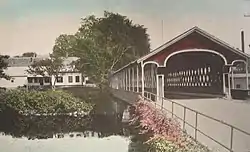 West Swanzey Covered Bridge c. 1915 | |
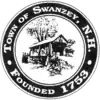 Seal | |
| Motto(s): "Bridging Tradition and Change" | |
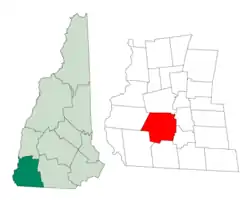 Location in Cheshire County, New Hampshire | |
| Coordinates: 42°52′11″N 72°16′54″W | |
| Country | United States |
| State | New Hampshire |
| County | Cheshire |
| Incorporated | 1753 |
| Villages |
|
| Government | |
| • Board of Selectmen |
|
| • Town Administrator | Michael T. Branley |
| Area | |
| • Total | 45.3 sq mi (117.4 km2) |
| • Land | 45.0 sq mi (116.5 km2) |
| • Water | 0.3 sq mi (0.9 km2) 0.79% |
| Elevation | 492 ft (150 m) |
| Population (2020)[2] | |
| • Total | 7,270 |
| • Density | 162/sq mi (62.4/km2) |
| Time zone | UTC-5 (Eastern) |
| • Summer (DST) | UTC-4 (Eastern) |
| ZIP codes | |
| Area code | 603 |
| FIPS code | 33-75700 |
| GNIS feature ID | 0873735 |
| Website | www |
History
First granted in 1733 as "Lower Ashuelot", Swanzey was one of the fort towns established by Governor Jonathan Belcher of Massachusetts, which then claimed the territory. The town was the site of many battles during King George's War, and in 1747 it was abandoned for three years. It was regranted to 62 proprietors on July 2, 1753, by Governor Benning Wentworth as "Swanzey", most probably because some early settlers had a connection to Swansea in Wales.[3] Situated on the Ashuelot River and connected by the Ashuelot Railroad, West Swanzey developed as a textile mill town, and East Swanzey produced wooden buckets for generations. By 1859, the population was 2,106.[4]
The town features four covered bridges, and was the home of theatrical trouper Denman Thompson, who gained a national reputation by his portrayal of the Yankee farmer, "Joshua Whitcomb", star of his stage play The Old Homestead. Residents restage Thompson's melodrama every summer at a natural outdoor amphitheater called the Potash Bowl.[5]
Because he vacationed in Swanzey during several summers, the town has claimed to be the location of a tree that inspired poet Joyce Kilmer (1886–1918) to write the popular 1913 poem "Trees". However, family accounts and documents establish that the poem was written in Mahwah, New Jersey.[6][7][8]
 Post Office c. 1915
Post Office c. 1915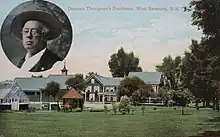 Denman Thompson's residence in 1907
Denman Thompson's residence in 1907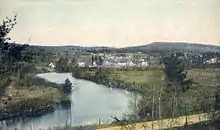 Ashuelot River c. 1915
Ashuelot River c. 1915
Geography
According to the United States Census Bureau, the town has a total area of 45.3 square miles (117.4 km2), of which 45.0 square miles (116.5 km2) are land and 0.35 square miles (0.9 km2) are water, comprising 0.79% of the town. Swanzey is drained by the Ashuelot River, a southwest-flowing tributary of the Connecticut River. The town's highest point is the summit of Franklin Mountain at 1,423 feet (434 m), on the border with Winchester.
The town is crossed by New Hampshire Route 10, New Hampshire Route 12 and New Hampshire Route 32.
Adjacent municipalities
- Keene (north)
- Marlborough (northeast)
- Troy (southeast)
- Richmond (south)
- Winchester (southwest)
- Chesterfield (west)
Demographics
| Census | Pop. | Note | %± |
|---|---|---|---|
| 1790 | 1,157 | — | |
| 1800 | 1,271 | 9.9% | |
| 1810 | 1,400 | 10.1% | |
| 1820 | 1,716 | 22.6% | |
| 1830 | 1,816 | 5.8% | |
| 1840 | 1,755 | −3.4% | |
| 1850 | 2,106 | 20.0% | |
| 1860 | 1,798 | −14.6% | |
| 1870 | 1,626 | −9.6% | |
| 1880 | 1,661 | 2.2% | |
| 1890 | 1,600 | −3.7% | |
| 1900 | 1,570 | −1.9% | |
| 1910 | 1,656 | 5.5% | |
| 1920 | 1,593 | −3.8% | |
| 1930 | 2,066 | 29.7% | |
| 1940 | 2,262 | 9.5% | |
| 1950 | 2,806 | 24.0% | |
| 1960 | 3,626 | 29.2% | |
| 1970 | 4,254 | 17.3% | |
| 1980 | 5,183 | 21.8% | |
| 1990 | 6,236 | 20.3% | |
| 2000 | 6,800 | 9.0% | |
| 2010 | 7,230 | 6.3% | |
| 2020 | 7,270 | 0.6% | |
| U.S. Decennial Census[2][9] | |||
As of the census of 2010, there were 7,230 people, 2,957 households, and 1,978 families residing in the town. There were 3,205 housing units, of which 248, or 7.7%, were vacant. The racial makeup of the town was 96.0% white, 0.3% African American, 0.2% Native American, 1.7% Asian, 0.03% Native Hawaiian or Pacific Islander, 0.4% some other race, and 1.4% from two or more races. 1.5% of the population were Hispanic or Latino of any race.[10]
Of the 2,957 households, 28.0% had children under the age of 18 living with them, 51.0% were headed by married couples living together, 10.5% had a female householder with no husband present, and 33.1% were non-families. 24.0% of all households were made up of individuals, and 9.1% were someone living alone who was 65 years of age or older. The average household size was 2.45, and the average family size was 2.88.[10]
In the town, 20.4% of the population were under the age of 18, 7.9% were from 18 to 24, 24.6% from 25 to 44, 32.2% from 45 to 64, and 14.8% were 65 years of age or older. The median age was 43.0 years. For every 100 females, there were 94.8 males. For every 100 females age 18 and over, there were 94.4 males.[10]
For the period 2011–2015, the estimated median annual income for a household was $57,632, and the median income for a family was $68,371. Male full-time workers had a median income of $50,017 versus $42,778 for females. The per capita income for the town was $33,749. 14.2% of the population and 10.5% of families were below the poverty line. 39.0% of the population under the age of 18 and 4.9% of those 65 or older were living in poverty.[11]
Education
Sites of interest
- Swanzey Historical Museum
- West Swanzey Covered Bridge, built in 1832
Notable people
- Loyal B. Stearns (1853–1936), jurist, Oregon state representative
- Denman Thompson (1833–1911), playwright, theatre actor
References
- "2021 U.S. Gazetteer Files – New Hampshire". United States Census Bureau. Retrieved November 5, 2021.
- "Swanzey town, Cheshire County, New Hampshire: 2020 DEC Redistricting Data (PL 94-171)". U.S. Census Bureau. Retrieved November 5, 2021.
- Read, Benjamin (1892). The History of Swanzey, New Hampshire, from 1734 to 1890. Salem, Massachusetts: Salem Press. p. 52.
- Coolidge, Austin J.; John B. Mansfield (1859). A History and Description of New England. Boston, Massachusetts: A.J. Coolidge. pp. 661–663.
coolidge mansfield history description new england 1859.
- New Hampshire Economic and Labor Market Information Bureau Profile
- Federal Writers' Project for the Works Progress Administration of the State of New Hampshire. New Hampshire: A Guide to the Granite State (Boston: Houghton Mifflin & Co., 1938), 103.
- Kelly, Mike. "Did Mahwah's trees inspire Joyce Kilmer's famous poem?" in The Bergen Record (26 January 2013). Retrieved 18 June 2013.
- Associated Press. "Doomed Oak Said Kilmer Poem Source" in The Berkshire Eagle (16 September 1963), 8.
- "Census of Population and Housing". Census.gov. Retrieved June 4, 2016.
- "Profile of General Population and Housing Characteristics: 2010 Census Summary File 1 (DP-1): Swanzey town, Cheshire County, New Hampshire". U.S. Census Bureau, American Factfinder. Archived from the original on February 14, 2020. Retrieved October 27, 2017.
- "Selected Economic Characteristics: 2011-2015 American Community Survey 5-Year Estimates (DP03): Swanzey town, Cheshire County, New Hampshire". U.S. Census Bureau, American Factfinder. Archived from the original on February 13, 2020. Retrieved October 27, 2017.
